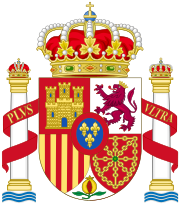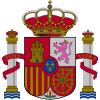
Back سياسة إسبانيا Arabic سياسة اسپانيا ARZ Política d'España AST Държавно устройство на Кралство Испания Bulgarian Política d'Espanya Catalan Politický systém Španělska Czech Politisches System Spaniens German Πολιτική της Ισπανίας Greek Política de España Spanish Politique en Espagne French
 |
|---|
Politics of Spain | |
|---|---|
 | |
| Polity type | Unitary parliamentary constitutional monarchy |
| Constitution | Constitution of Spain |
| Legislative branch | |
| Name | General Courts |
| Type | Bicameral |
| Meeting place | Palace of the Senate Palace of the Courts |
| Upper house | |
| Name | Senate |
| Presiding officer | Pedro Rollán, President of the Senate |
| Lower house | |
| Name | Congress of Deputies |
| Presiding officer | Francina Armengol, President of the Congress of Deputies |
| Executive branch | |
| Head of state | |
| Title | Monarch |
| Currently | Felipe VI |
| Appointer | Hereditary |
| Head of government | |
| Title | Prime Minister |
| Currently | Pedro Sánchez |
| Appointer | Monarch |
| Cabinet | |
| Name | Council of Ministers |
| Current cabinet | Sánchez III Government |
| Leader | Prime Minister |
| Deputy leader | First Deputy Prime Minister |
| Appointer | Monarch |
| Headquarters | Palace of Moncloa |
| Judicial branch | |
| Name | Judiciary of Spain |
| Courts | High Courts of Justice |
| Supreme Court | |
| Chief judge | Vicente Guilarte (acting) |
| Seat | Convent of the Salesas Reales |
| National Court | |
| Chief judge | José Ramón Navarro |
The politics of Spain takes place under the framework established by the Constitution of 1978. Spain is established as a social and democratic sovereign country[1] wherein the national sovereignty is vested in the people, from which the powers of the state emanate.[1]
The form of government in Spain is a parliamentary monarchy,[1] that is, a social representative democratic constitutional monarchy in which the monarch is the head of state, while the prime minister—whose official title is "President of the Government"—is the head of government. Executive power is exercised by the Government, which is made up of the prime minister, the deputy prime ministers and other ministers, which collectively form the Cabinet, or Council of Ministers. Legislative power is vested in the Cortes Generales (General Courts), a bicameral parliament constituted by the Congress of Deputies and the Senate. The judiciary is independent of the executive and the legislature, administering justice on behalf of the King by judges and magistrates. The Supreme Court of Spain is the highest court in the nation, with jurisdiction in all Spanish territories, superior to all in all affairs except constitutional matters, which are the jurisdiction of a separate court, the Constitutional Court.
Spain's political system is a multi-party system, but since the 1990s two parties have been predominant in politics, the Spanish Socialist Workers' Party (PSOE) and the People's Party (PP). Regional parties, mainly the Basque Nationalist Party (EAJ-PNV), from the Basque Country, and Convergence and Union (CiU) and the Republican Left of Catalonia (ERC), from Catalonia, have also played key roles in Spanish politics. Members of the Congress of Deputies are selected through proportional representation, and the government is formed by the party or coalition that has the confidence of the Congress, usually the party with the largest number of seats. Since the Spanish transition to democracy, when parties failed to obtain absolute majorities, the tendency was to form minority governments. However, this tendency was broken in 2020 with the formation of the Second government of Pedro Sánchez, formed by members of the Spanish Socialist Workers' Party and Unidas Podemos, as well as independents proposed by both parties. This was the first nationwide coalition government to be formed in Spain since the Second Spanish Republic.
Regional government functions under a system known as state of autonomies, a highly decentralized system of administration (systematically ranked 2nd in the world after Germany at the Regional Authority Index, since 1998).[2] Initially framed as a kind of "asymmetrical federalism" for the regions styled as "historic nationalities", it rapidly evolved into the creation of regions throughout Spain and the devolution of powers to all, widely known as "coffee for everyone".[3] Exercising the right to self-government granted by the constitution, the "nationalities and regions" have been constituted as 17 autonomous communities and two autonomous cities. The form of government of each autonomous community and autonomous city is also based on a parliamentary system, in which executive power is vested in a "president" and a Council of Ministers, elected by and responsible to a unicameral legislative assembly.
The Economist Intelligence Unit downgraded Spain from full democracy to "flawed democracy" in 2022, because of concerns about its judicial independence, given the "political divisions over the appointment of new magistrates to the General Council of the Judiciary (CGPJ)".[4] Spain returned to the label of full democracy in 2023.[5]
According to the V-Dem Democracy indices, in 2023 Spain was the 11th most electorally democratic country in the world.[6]
- ^ a b c Spanish Constitution 1978, Article 1.
- ^ Muro & Lago 2020, p. 7.
- ^ Fishman 2020, p. 27.
- ^ "Spain downgraded to a 'flawed democracy' by The Economist index". Catalan News. 10 February 2022.
- ^ Garcia, Lucia (15 February 2024). "Democracy Index: conflict and polarisation drive a new low for global democracy". Economist Intelligence Unit. Retrieved 15 October 2024.
- ^ V-Dem Institute (2023). "The V-Dem Dataset". Retrieved 14 October 2023.